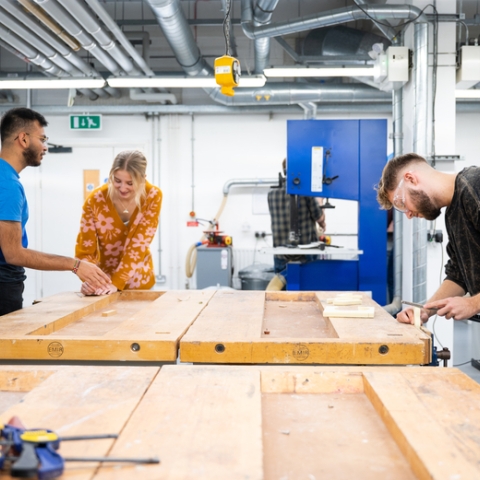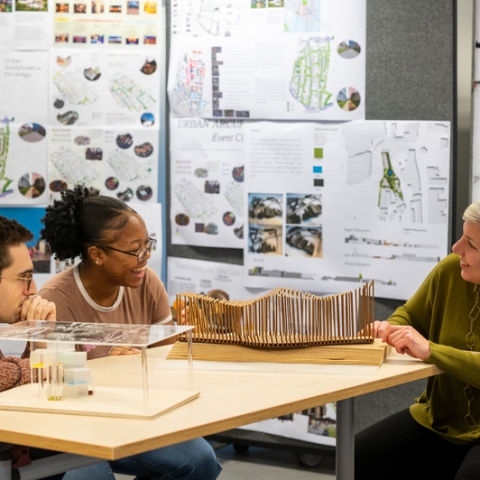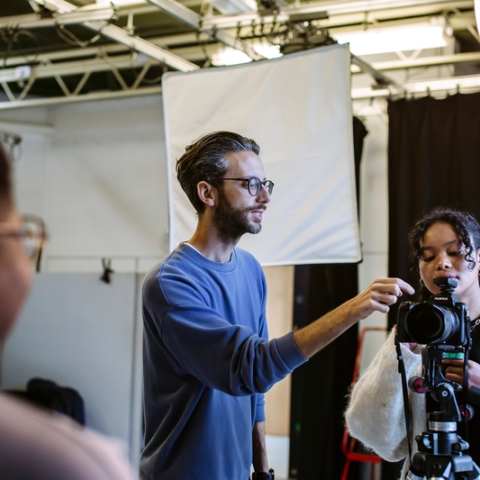
Key information
Accreditation:
This course is Accredited
Typical offer:
120-128 UCAS points to include a minimum of 3 A levels, or equivalent
Showing content for section Overview
Overview
Architects design buildings and play a role in shaping cities, communities and the way we live. To become an architect, you need qualifications recognised by the Architects Registration Board (ARB).
This Architectural Assistant Degree Apprenticeship course is the first step to achieving these qualifications. You'll develop the technical and analytical skills you need to begin a career as an architect – all while earning a salary and getting on-the-job experience.
During term time, you'll spend 1 day a week on day release at the University and the other 4 days applying your skills and getting practical experience in the workplace. The Government or your employer pay your tuition fees – so your architecture degree doesn’t cost you anything.
When you finish your apprenticeship, you'll have a Bachelor's degree in architecture and you'll be primed to take on further study to continue your journey in becoming a registered architect.
Course highlights
- Explore design in collaborative studio spaces alongside your peers, while developing your individual and team skills
- Expand your architectural thinking beyond practice with specialist tutors and architects
- Access the latest software, including BIM modelling, advanced parametric modelling, environmental evaluation software, 3d scanning and printing tools, to support your design work and challenge your creative thinking
- Explore a variety of architectural challenges outside of practice to develop your design creativity
- Develop design skills through model making, material testing, sketching and drawing
- Have access to the University's student support services and community, including the Library, study support, sports and recreation facilities, and the Students’ Union
- Build a network of professional peers during your time at university, sharing your ideas and knowledge
- Get practical work experience in your job, giving you an advantage in leaving the course, with four years' experience plus your qualifications
- Get a personal tutor from the University and a workplace mentor

Recognition and validation
This course is prescribed and recognised by the Architects Registration Board (ARB) and validated by the Royal Institute of British Architects (RIBA).
This accreditation means you'll satisfy the criteria for ARB Part 1 exemption and RIBA Part 1 exemption when you complete your apprenticeship, putting you one step closer to becoming registered as an architect.
I have learned about the materials used for buildings, model making and renders for drawings. I have enjoyed learning how to make scale, plan, elevation, section and technical drawings.
Contact us
Entry requirements
BA (Hons) Architectural Assistant Degree Apprenticeship
Typical offers
- A levels - ABB-BBB
- UCAS points - 120-128 points to include a minimum of 3 A levels, or equivalent (calculate your UCAS points)
- T-levels - Merit
- BTECs (Extended Diplomas) - DDM
- International Baccalaureate - 25-26
- All applicants to the Degree Apprenticeship courses must have an acceptable Level 2 qualification in English and Mathematics. Acceptable qualifications include GCSE with grade C/4 or above and Functional Skills with Pass - please note that we are not able to accept all kinds of Level 2 qualifications, so if you are unsure whether you have a suitable qualification, please get in touch.
You may need to have studied specific subjects – find full entry requirements and other qualifications we accept.
Selection process
- All applicants will be required to complete a Skills Gap Analysis before completing an application form
- All applicants will be invited to attend an academic interview and may be asked to submit a portfolio of work or undertake additional assessment
- If you do not have an acceptable qualification, you will be required to take an additional assessment during the application process
We look at more than just your grades
While we consider your grades when making an offer, we also carefully look at your circumstances and other factors to assess your potential. These include whether you live and work in the region and your personal and family circumstances which we assess using established data.
You and your employer
When you begin studying for your degree apprenticeship:
- You need to be 18 or over
- You should be able to satisfy government requirements on residency:
- you must be a citizen or have the right to live in the UK/EEA
- you must have been a resident in the UK/EEA (not the Channel Islands or Isle of Man) for a minimum of 3 years
- you must not need a Student Route visa, and must not have been on a Student Route visa within the past 3 years
- You need to have the right to work in the UK, and to spend at least 50% of your working hours in England
- Your job should meet the requirements of the apprenticeship standard relevant to this degree – we can advise you and your employer on this
- Your employer needs to have registered an apprentice service account – we can help your employer with this if needed
If you aren't currently working in a relevant field, you can apply for a job and degree apprenticeship simultaneously. Read more about applying for this degree apprenticeship.
Facilities
Careers and opportunities
Many architecture graduates continue their training towards becoming a registered architect with further study at Master's level or registration on a Architect Degree Apprenticeship (Master of Architecture and Professional Practice) – equivalent to ARB and RIBA Part 2 and 3.
You can use your skills in areas such as:
- design practice
- planning
- historic building conservation
- project management
Roles our architecture graduates have taken on include:
- architectural design
- interior design
- landscape architecture
- urban design and master planning
- planning
- architectural technology
- product design
- graphic design
- lighting design
- set design
After you leave the University, you can get help, advice and support for up to 5 years from our Careers and Employability service as you advance in your career.
Modules
Each module on this Architectural Assistant Degree Apprenticeship is worth a certain number of credits.
In year 1 and 2, you'll study modules worth a total of 80 credits in each year. In years 3 and 4, you'll study modules worth a total of 100 credits.
What you’ll study
Core modules
All modules in the year are core.
More information for this module will be available soon.
More information for this module will be available soon.
Core modules
All modules in the year are core.
You’ll research past projects and analyse international sites to come up with sensitive solutions. Learn to take the unique aspects of each place and its people and turn them into alluring architectural visions. You’ll grasp how to integrate structural and environmental strategies to create cohesive designs. You’ll also get good at communicating your ideas with clear visual stories. Expect to iterate on your designs, taking in feedback as you go.
By engaging with the specifics and complexity of real-world problems, you’ll refine your design process to create buildings enhancing lives globally. Let your ideas grow into culturally aware, sustainable architecture.
You’ll study the client needs, site, budget, and other constraints shaping the brief. Learn how to turn these requirements into buildable designs. Critically look at past examples and solutions. Tell the story of the project through compelling visual narratives and exercises that bring together different influences into your own design. You’ll also reflect on an architect’s ethical responsibilities to their client, society, and profession.
By combining your study with real-world experience, you'll gain valuable insights into commercial design and your role as an architect.
You'll evaluate influential histories and theories that have shaped these creative practices. More importantly, you'll learn to think critically about the context and real-world issues surrounding design. Through discussions, projects and presentations, you'll develop your own perspectives on how design can address today's big issues. Your communication skills will grow as you articulate original ideas through diverse media. By the end, you'll have a deeper appreciation for the narratives, concepts and challenges that drive innovation in architecture and design.
In this module, you’ll look at different systems, from structure to the building’s outer layer, and see their impact on space. Learn from past designs how to balance attractiveness and efficiency. Get to grips with tools that help analyse elements like natural light and sound quality from the start. Understand how things are made, put together, and the finer details. Use your new understanding of technologies and eco-friendly architecture in a hands-on design project.
With practical experience thinking holistically across technology, environment, and design, you’ll know how to create innovative buildings elevating user comfort and wellbeing.
Core modules
All modules in the year are core.
You'll develop strategies for interviews, portfolios, and effective communication.
Through case studies, you'll gain insights into project delivery, practice management, and the architect's multifaceted role.
This module covers legal and ethical duties, helping you navigate the complex matrix of building regulations.
You'll also learn to collaborate across disciplines, managing stakeholders professionally.
On completion, you'll have the knowledge and confidence to thrive in the dynamic world of architectural practice.
You’ll investigate sites, delving into their history and environmental aspects. Your architectural concepts will emerge as reflections of these insights. Ideas evolve as you go through cycles of drawing, modeling, and discussing your work. You’ll present a creative proposal that tackles the complexities of the site. Along the way, it’s important to think critically about your design choices and how you communicate them.
Engaging thoroughly with a place and its purpose sharpens your abilities in research, idea generation, and presentation, all crucial to an architect’s creative journey.
Allow the unique aspects of each context to inspire your designs, leading to innovative shapes and spaces.
You’ll understand the intricate requirements of a specific locality. This understanding will help you craft a creative brief for a building that engages the public. Looking into past examples will reveal various influences on your work. Your response to the brief will take shape as you create models and drawings, continuously refining them. Incorporating structural and environmental considerations is also key. At the end, you’ll present a design that not only reflects the site’s story but also showcases your unique creative vision.
Throughout this process, as you work on cultural buildings, your design skills will grow, highlighting how architecture can positively impact communities.
Look at how big cultural, industrial, and philosophical changes have influenced building styles and how we think about space. Discuss important modernist buildings from around the world and their impacts. Think about designs that focus on social and environmental responsibility. Build your own way of understanding projects, guiding your work, and thoughtfully connecting with history.
By learning about the recent history of architecture, you’ll find both inspiring examples and cautionary tales.
With guidance, you'll develop and execute an in-depth investigation of a focused theme.
Your skills in critical analysis, academic writing, and source evaluation will be honed through the process of proposing, researching, and presenting original findings.
This self-directed module allows you to define your own learning experience within the rich landscape of architectural history and theory.
You'll produce a dissertation showcasing your knowledge and insight into this profoundly influential field.
Core modules
All modules in the year are core.
Discover modern city settings and brainstorm thoughtful ideas for different areas, from small communities to entire districts.
You’ll create a building plan that considers the environment, society, and the economy.
You’ll also test and use your technical know-how to find the best materials and structures for your designs.
This module is a fantastic opportunity to improve your design approach through self-reflection.
You’ll explain how you approach creativity and why you made certain choices in terms of the course, context, and how things look. By summarising your projects, you’ll be able to express your unique architectural style and philosophy.
This module allows you to bring together your technical solutions, ideas, and critical viewpoints. It’s a way to showcase what you’ve learned and use it as a base for future development.
You’ll get a project brief and then create a plan using your research, creative design, and technical know-how.
Build your design with attention to the location, what users need, how to make it sustainable, and how to construct it. Show your work through drawings, models, and written stories.
You’ll show your knowledge of architectural history, theories, technology, and practice through exams. Above all, you’ll reflect on your personal growth and areas for improvement.
By passing the final assessment, you’ll show employers you’re up to the standards of the industry in knowledge, skills, and behaviour.
This module is your chance to show off your own design style before you start your professional career.
You’ll explore how to use structures, materials, energy, and technology for architecture. Then you’ll make an architectural plan that uses these elements.
Use simple models to test and improve your plan. Think about how the weather, building methods and materials affect your design.
You’ll also look at the costs of different products. Most importantly, you’ll see why you need to care about the environment in every step of your design.
This module will let you create sustainable plans that work well. Your plans will show how technology and environment are connected.
Changes to course content
We use the best and most current research and professional practice alongside feedback from our students to make sure course content is relevant to your future career or further studies.
Therefore, course content is revised and regularly reviewed. This may result in changes being made in order to reflect developments in research, learning from practice and changes in policy at both national and local levels.
Teaching
Teaching methods on this Architectural Assistant Degree Apprenticeship include:
- lectures
- seminars
- computer-based tutorials
- studios
- workshops
- online learning
You'll keep in regular contact with your practice mentor, who supports you throughout your design projects while you study.
How you're assessed
Assessment methods on this architectural assistant degree apprenticeship include:
- coursework and written essays
- presentations
- portfolio
You’ll be able to test your skills and knowledge informally before you do assessments that count towards your final mark.
You'll get feedback on all practice and formal assessments so you can improve in the future.
How you'll spend your time
On this Architectural Assistant Degree Apprenticeship, you'll spend four days a week at work and one day a week at University for around 32 teaching weeks each year.
The day of the week you're at University varies through the course, but will be the same day of the week each year so you can fit your study time into your working routine and other commitments.
During the weeks you don't go into university, you'll still spend six hours of your time learning outside of your main job role.
Course costs and funding
Tuition fees
The course fee is shared between the Government and some employers, meaning no cost to you as the degree apprentice. Total tuition fees are £25,000 paid over 4 years.
Please see our Degree Apprenticeships page, or contact us, for further information.
Additional course costs
These course-related costs aren’t included in the tuition fees. So you’ll need to budget for them when you plan your spending.
Costs breakdown
Our accommodation section shows your accommodation options and highlights how much it costs to live in Portsmouth.
You’ll study up to 6 modules a year. You may have to read several recommended books or textbooks for each module.
You can borrow most of these from the Library. If you buy these, they may cost up to £60 each.
We recommend that you budget £75 a year for photocopying, memory sticks, DVDs and CDs, printing charges, binding and specialist printing.
If your final year includes a major project, there could be cost for transport or accommodation related to your research activities. The amount will depend on the project you choose.
How to apply
Application deadline
- The application deadline to start in September 2024 is to be confirmed.
Applications received after this date may not be considered.
I'm applying with my current employer
If you're already in full-time work, and your employer is interested in you studying this course, get them to contact us and we'll work out how to work together.
If your employer isn't interested yet, you might find it useful to share our information for employers page with them.
Employer contact form Information for employers
I'm looking for a job with a Degree Apprenticeship role
If you're not in full-time employment, or your current employer is not interested in degree apprenticeships, you'll need to find a role that does offer a degree apprenticeship. You can search the gov.uk list of open degree apprenticeship vacancies, or contact us with your details and we'll let you know when degree apprenticeship vacancies come up.
When you apply for a role that includes one of our degree apprenticeships, you'll follow the company's standard recruitment process for the job, while we assess your academic suitability for the course.
Search degree apprenticeship roles (gov.uk) Contact us
Admissions terms and conditions
When you accept an offer to study at the University of Portsmouth, you also agree to abide by our Student Contract (which includes the University's relevant policies, rules and regulations). You should read and consider these before you apply.







